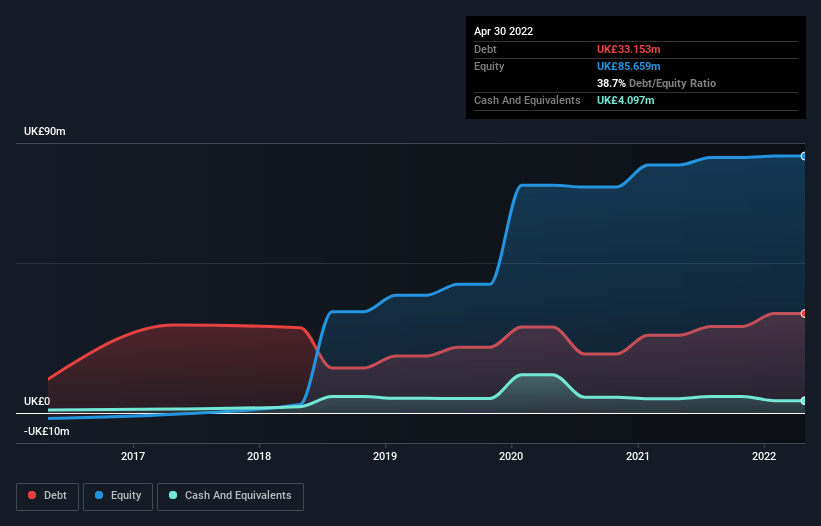- United Kingdom
- /
- Professional Services
- /
- AIM:KGH
Is Knights Group Holdings (LON:KGH) Using Too Much Debt?

Howard Marks put it nicely when he said that, rather than worrying about share price volatility, 'The possibility of permanent loss is the risk I worry about... and every practical investor I know worries about.' It's only natural to consider a company's balance sheet when you examine how risky it is, since debt is often involved when a business collapses. We note that Knights Group Holdings plc (LON:KGH) does have debt on its balance sheet. But the real question is whether this debt is making the company risky.
When Is Debt A Problem?
Debt and other liabilities become risky for a business when it cannot easily fulfill those obligations, either with free cash flow or by raising capital at an attractive price. If things get really bad, the lenders can take control of the business. However, a more usual (but still expensive) situation is where a company must dilute shareholders at a cheap share price simply to get debt under control. Of course, debt can be an important tool in businesses, particularly capital heavy businesses. The first step when considering a company's debt levels is to consider its cash and debt together.
Check out our latest analysis for Knights Group Holdings
What Is Knights Group Holdings's Net Debt?
The image below, which you can click on for greater detail, shows that at April 2022 Knights Group Holdings had debt of UK£33.2m, up from UK£25.9m in one year. However, it also had UK£4.10m in cash, and so its net debt is UK£29.1m.

How Strong Is Knights Group Holdings' Balance Sheet?
According to the last reported balance sheet, Knights Group Holdings had liabilities of UK£30.7m due within 12 months, and liabilities of UK£89.1m due beyond 12 months. Offsetting this, it had UK£4.10m in cash and UK£60.3m in receivables that were due within 12 months. So its liabilities total UK£55.4m more than the combination of its cash and short-term receivables.
This deficit is considerable relative to its market capitalization of UK£80.0m, so it does suggest shareholders should keep an eye on Knights Group Holdings' use of debt. This suggests shareholders would be heavily diluted if the company needed to shore up its balance sheet in a hurry.
We use two main ratios to inform us about debt levels relative to earnings. The first is net debt divided by earnings before interest, tax, depreciation, and amortization (EBITDA), while the second is how many times its earnings before interest and tax (EBIT) covers its interest expense (or its interest cover, for short). This way, we consider both the absolute quantum of the debt, as well as the interest rates paid on it.
Knights Group Holdings has net debt of just 1.3 times EBITDA, indicating that it is certainly not a reckless borrower. And it boasts interest cover of 7.9 times, which is more than adequate. But the other side of the story is that Knights Group Holdings saw its EBIT decline by 5.2% over the last year. That sort of decline, if sustained, will obviously make debt harder to handle. The balance sheet is clearly the area to focus on when you are analysing debt. But it is future earnings, more than anything, that will determine Knights Group Holdings's ability to maintain a healthy balance sheet going forward. So if you want to see what the professionals think, you might find this free report on analyst profit forecasts to be interesting.
Finally, a company can only pay off debt with cold hard cash, not accounting profits. So we always check how much of that EBIT is translated into free cash flow. In the last three years, Knights Group Holdings's free cash flow amounted to 37% of its EBIT, less than we'd expect. That's not great, when it comes to paying down debt.
Our View
While Knights Group Holdings's level of total liabilities does give us pause, its interest cover and net debt to EBITDA suggest it can stay on top of its debt load. When we consider all the factors discussed, it seems to us that Knights Group Holdings is taking some risks with its use of debt. While that debt can boost returns, we think the company has enough leverage now. When analysing debt levels, the balance sheet is the obvious place to start. However, not all investment risk resides within the balance sheet - far from it. We've identified 4 warning signs with Knights Group Holdings , and understanding them should be part of your investment process.
At the end of the day, it's often better to focus on companies that are free from net debt. You can access our special list of such companies (all with a track record of profit growth). It's free.
Valuation is complex, but we're here to simplify it.
Discover if Knights Group Holdings might be undervalued or overvalued with our detailed analysis, featuring fair value estimates, potential risks, dividends, insider trades, and its financial condition.
Access Free AnalysisHave feedback on this article? Concerned about the content? Get in touch with us directly. Alternatively, email editorial-team (at) simplywallst.com.
This article by Simply Wall St is general in nature. We provide commentary based on historical data and analyst forecasts only using an unbiased methodology and our articles are not intended to be financial advice. It does not constitute a recommendation to buy or sell any stock, and does not take account of your objectives, or your financial situation. We aim to bring you long-term focused analysis driven by fundamental data. Note that our analysis may not factor in the latest price-sensitive company announcements or qualitative material. Simply Wall St has no position in any stocks mentioned.
About AIM:KGH
Knights Group Holdings
Provides legal and professional services in the United Kingdom.
Undervalued with moderate growth potential.
Market Insights
Community Narratives





